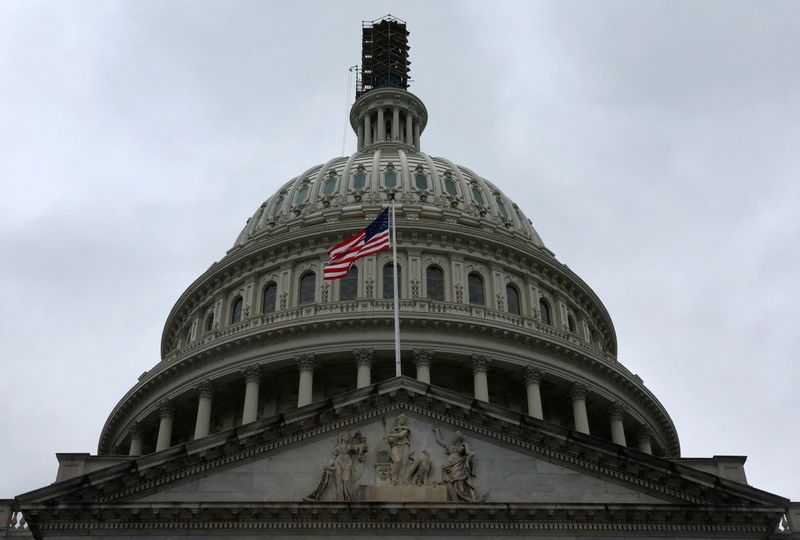By Bo Erickson
WASHINGTON (Reuters) - Former union leader Dan Osborn's independent run for U.S. Senate in deeply Republican Nebraska has shown unexpected strength and if he pulls off an upset victory could make the Navy veteran a Washington wild card next year.
A series of recent polls has shown Osborn within striking distance of incumbent Republican Senator Deb Fischer, a surprise in a state where Republican presidential candidate Donald Trump leads Democratic Vice President Kamala Harris by 18 percentage points and that last elected a Democrat to the Senate in 2006.
Democrats stayed out of the race, setting up a one-on-one contest where Osborn has campaigned on a populist message that straddles the major parties' priorities: supporting both abortion rights and gun rights, speaking out against the power of corporate America and describing illegal immigration as a "pool of cheap labor."
"I am frustrated with both sides catering to the extremes," Osborn, a mechanic, said in a recent televised town hall with local station KETV. "Less than two percent of our elected officials both in the House and Senate come from the working class, so I can bring a unique perspective to Congress."
Osborn said that if elected, he won't caucus with either major party, unlike long-serving independent Senators Bernie Sanders and Angus King, who normally vote with Democrats and are counted among their ranks for purposes of allocating power.
That could complicate Republicans' hopes of erasing Democrats' current 51-49 majority in the chamber. Depending on the overall margin of control, it could give Osborn a pivotal vote, akin to the role that once-Democratic, now-independent Senators Joe Manchin and Kyrsten Sinema played in alternately advancing and blocking parts of Democratic President Joe Biden's agenda.
'CLOSER THAN ANYBODY EXPECTED'
Nebraska is one of just two states that allocate its votes in the Electoral College that picks presidents by congressional district, which has inspired a heavy Democratic get-out-the-vote effort focused on the liberal-leaning areas around Omaha.
"This Senate race is closer than anybody expected," said Elizabeth Theiss-Morse, political science professor at the University of Nebraska-Lincoln. But in a deeply conservative state, she added, "Republicans are likely to stay with their party when push comes to shove."
The four most recent polls on the race, all this month and funded by Osborn's campaign or Fischer's campaign, range from giving the incumbent a six percentage point lead to favoring Osborn by a similar margin.
Osborn rose to prominence for leading a 2021 strike against cereal maker Kellogg (NYSE:K)'s in Omaha, and major unions have powered his campaign through endorsements and donations, though Osborn's campaign eschews corporate PAC donations.
The Republican Fischer, a cattle rancher first elected to the Senate in 2012, touts herself as "Nebraska’s voice, Trump’s choice," and campaigns on a slate of agricultural and rural issues affecting veterans, law enforcement and senior citizens.
"I have a long, conservative record that's helped build Nebraska and keep America strong," Fischer said in a statement.
If elected, Osborn could face unique hurdles, given that Senate jobs and perks are allocated by the two major parties.
"The introduction of an independent who declines to even nominally caucus with either party would introduce an exciting - but confusing - dynamic to the Senate, especially with the chamber so closely divided," said John LaBombard, a bipartisan strategist and former aide to Sinema.
Osborn's campaign said he is confident that Senate rules allow for him to be on at least two committees, but LaBombard said the process to obtain these assignments is ambiguous and could require negotiation with one party's leadership or approval from 59 other senators for this go-it-alone approach.
Some Nebraskans said the mild-mannered politics of the state, where more than 20% of registered voters are unaligned with one of the major parties, could help Osborn.

"With our politics it's not just party line," said Ruth Huebner-Brown, co-founder of the "Blue Dot Nebraska" movement that aims to drive up Democratic support in the Omaha-area district with almost 11,000 yard signs that feature a simple blue dot in the state’s shape.
"I wish there were more people like him," she said. "He really does represent what Nebraska needs, which is, 'I will listen to both sides. I am in the middle.'"